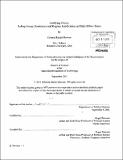Justifying power : ruling group dominance and regime justification in multi-ethnic states
Author(s)
Berman, Deborah Rachel
DownloadFull printable version (7.857Mb)
Alternative title
Ruling group dominance and regime justification in multi-ethnic states
Other Contributors
Massachusetts Institute of Technology. Dept. of Political Science.
Advisor
Roger Petersen.
Terms of use
Metadata
Show full item recordAbstract
The current but inconsistent upheaval in the Middle East suggests variations in what will topple regimes, and thus in how regimes have laid the groundwork to remain in power. This thesis examines variation in a social condition, relative dominance of a ruling ethnic group in a multi-ethnic society, as the source for systematic variations in how a mono-ethnic regime will justify its rule to the general population. This thesis argues that the ruling group's relative dominance, defined as its relative percentage to other groups in the population, drives a regime's justifying argument to be either rooted in the presence of universally lauded institutions (democratic-institutional), the regime's demonstrated record of economic and social developmental achievements (economic-social developmental), or the regime's ability to further the interests of an identity common to itself and the population at large (identificational). Relative dominance, it is contended, affects regime behavior by influencing the functioning of two mechanisms: the degree to which a regime can tolerate public accountability and the extent to which it needs to reduce the salience of ethnicity in order to endure. The thesis hypothesizes that the former decreases and the latter increases as dominance decreases. The thesis incorporates quantitative and qualitative analyses to measure and evaluate relationships between relative dominance and justifying arguments. It demonstrates the existence of relationships between dominance and regimes' justifying arguments by means of content analysis of senior leaders' speeches in eight Sunni-dominant, Shi'ite-subordinate countries--Bahrain, Egypt, Iraq (under Saddam Hussein), Jordan, Kuwait, Qatar, the United Arab Emirates, and Yemen. Case studies of one high-dominance country (the UAE), one medium-dominance (Yemen), one low-dominance (Iraq), and one outlier (Bahrain) then illustrate the speculated mechanisms in action.
Description
Thesis (S.M.)--Massachusetts Institute of Technology, Dept. of Political Science, 2011. Cataloged from PDF version of thesis. Includes bibliographical references.
Date issued
2011Department
Massachusetts Institute of Technology. Department of Political SciencePublisher
Massachusetts Institute of Technology
Keywords
Political Science.